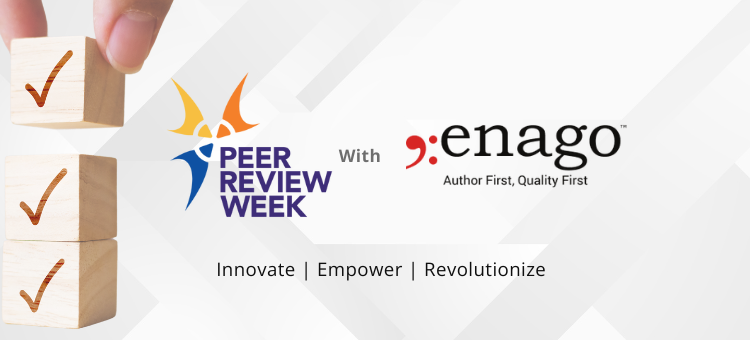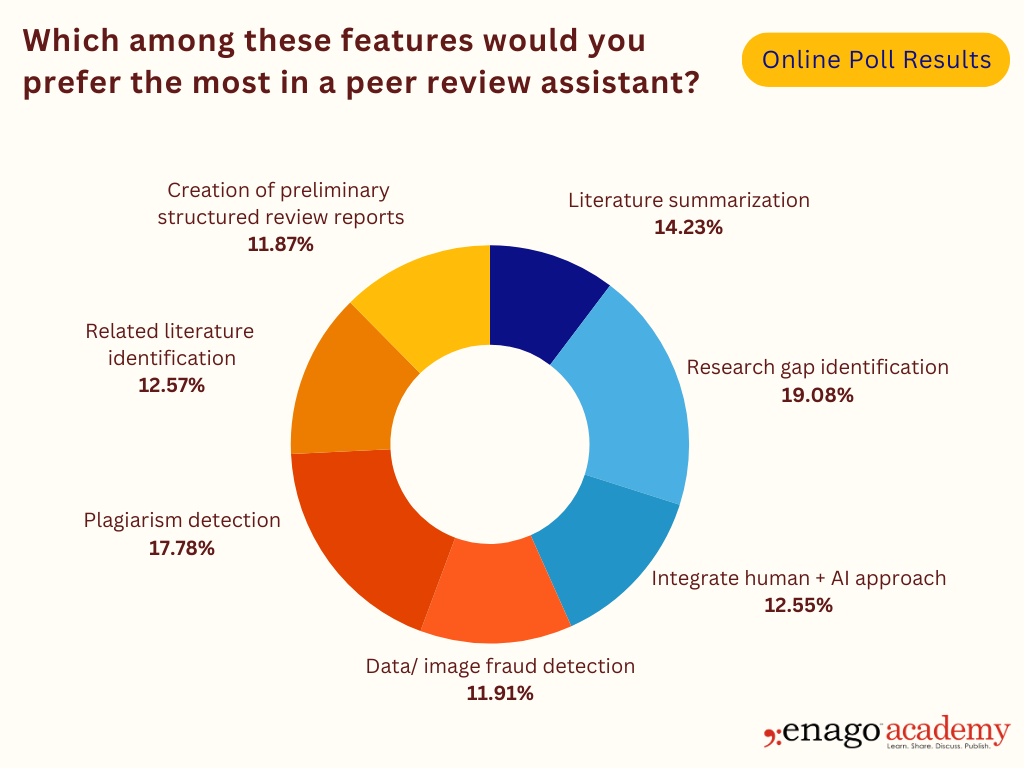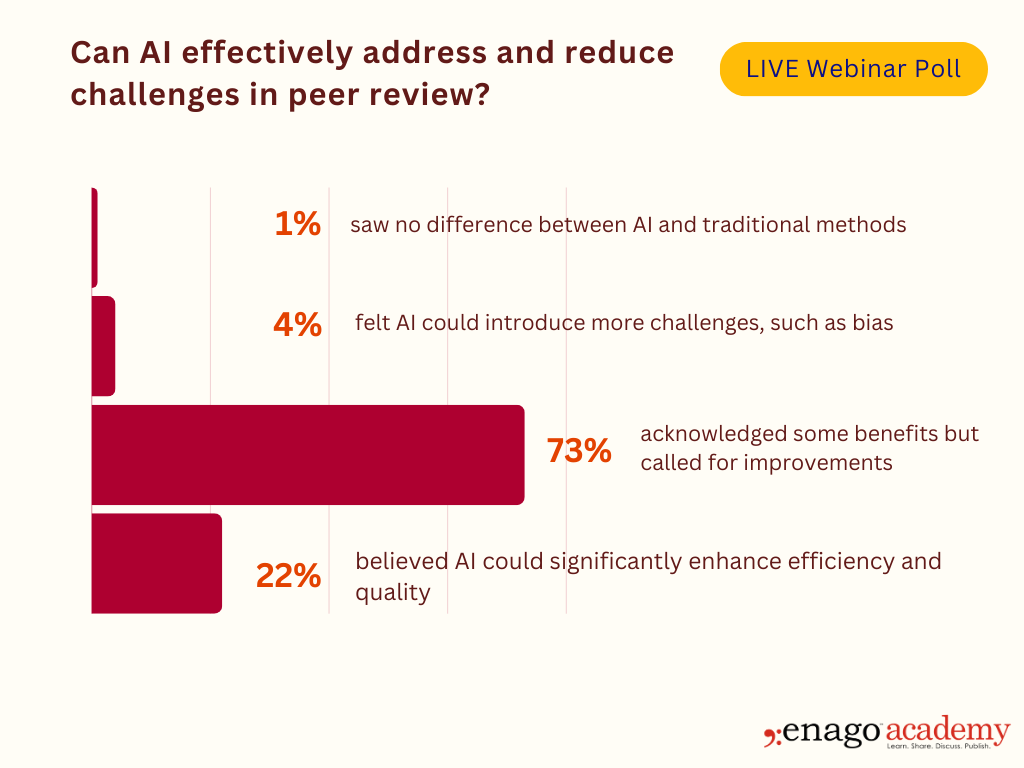Peer Review Week 2024: Reflections and takeaways

As AI-driven solutions draw attention with improved accuracy, speed, and transparency, their ethical use and potential contribution to peer review were the focus of the Peer Review Week (PRW) 2024. Like every year, the theme for this year’s PRW was based on an international poll and undoubtedly “Innovation and Technology in Peer Review”, emerged as the popular choice among stakeholders.
 This year, Enago, a member of the Peer Review Week steering committee, celebrated the week from September 23-27, 2024 with over 35 organizations around the globe. Our highlights include a podcast with Jennifer Mahar, Executive Peer Review Manager and Client Coordinator in Origin Editorial on striking an ethical balance with technology in peer review. We also hosted a versatile panel of industry leaders including Dr. Krishna Kumar Venkitachalam, Innovation Officer at Trinka AI, Piyush Agarwal, Lead Product Manager at Trinka AI, and Dr. Anupama Kapadia, Science Communication Expert & Editor in Chief at Enago Academy for a webinar on the responsible use of innovative technologies in peer review. Furthermore, we released a listicle of 6 AI tools for peer reviewers and an article illuminating the emerging peer review models.
This year, Enago, a member of the Peer Review Week steering committee, celebrated the week from September 23-27, 2024 with over 35 organizations around the globe. Our highlights include a podcast with Jennifer Mahar, Executive Peer Review Manager and Client Coordinator in Origin Editorial on striking an ethical balance with technology in peer review. We also hosted a versatile panel of industry leaders including Dr. Krishna Kumar Venkitachalam, Innovation Officer at Trinka AI, Piyush Agarwal, Lead Product Manager at Trinka AI, and Dr. Anupama Kapadia, Science Communication Expert & Editor in Chief at Enago Academy for a webinar on the responsible use of innovative technologies in peer review. Furthermore, we released a listicle of 6 AI tools for peer reviewers and an article illuminating the emerging peer review models.
Exploring the Ethical Use of AI in Peer Review
Peer reviewers play a crucial role in maintaining integrity of the scholarly record. Ethical considerations in peer review include confidentiality, objectivity, diligence, and conflicts of interest. Implementing AI in peer review brings new ethical challenges, such as determining how effectively AI systems can avoid human biases. As a result, the academic community’s stance on AI in peer review has been divided.
To gain a better understanding of current perspectives in the community, Enago conducted a global survey titled “Research Integrity and Retractions: A global study to understand the impact and response around ethical misconduct”. We gathered insights from a diverse group of 431 academics, industry leaders, publishers, reviewers, students, and research scholars. Our findings revealed that while a majority acknowledges the integral role of peer review in research communication, there are significant gaps in identifying ethical violations These include detecting AI-generated content, especially when time constrains and limited resources come to play.
While innovative technologies are improving the peer review process, there are concerns about over-reliance, transparency, and accessibility. These emphasize the need for a balanced approach between human oversight and technological integration. Read more about the challenges, innovations, and future directions of the peer review process in upholding research integrity in our opinion piece!
As the peer review landscape evolves, maintaining a balance between innovation and integrity remains crucial, especially in the context of AI-assisted tools. AI is transforming research workflows, turning the vision of a robust and transparent peer review system into reality. Promising tools that can act as peer review assistants are being developed to make the process more efficient.
What do Researchers want in a Peer Review Assistant?
The exponential increase in the volume of peer review submissions necessitates optimizing the screening and reviewing time to boost academic productivity. This can be achieved by mindfully implementing AI-powered peer review tools. They have the potential to create a semi-automated peer review system. These tools can filter out low-quality or controversial studies and match reviewers with manuscripts based on their expertise.
Enago Academy recently conducted an online poll to ascertain the most desirable features of such a tool. Our findings revealed that researchers highly value features such as research gap identification and plagiarism detection in peer review tools. Furthermore, we found a growing demand for assistance in summarization and the identification of related studies.
 Additionally, AI tools can assist by identifying gaps in research, suggesting related literature, and even spotting potential methodological concerns. These findings illustrate how integrating AI into the peer review process can refine the evaluation process by addressing the pain points identified by researchers.
Additionally, AI tools can assist by identifying gaps in research, suggesting related literature, and even spotting potential methodological concerns. These findings illustrate how integrating AI into the peer review process can refine the evaluation process by addressing the pain points identified by researchers.
Leveraging AI to automate repetitive tasks can support reviewers and authors alike. However, we explore how AI can mitigate these challenges and the concerns the community has about integrating AI into the peer review process.
Role of AI in Addressing the Challenges in Peer Review
Integrating AI in peer review could pave the way for a responsive and adaptable review system. AI technology holds promise in reducing the burden on reviewers while enhancing the quality of peer evaluations. Thus, we explored how to use these technologies, ethically and effectively in peer review processes. Watch this informative discourse with industry leaders in our exclusive webinar titled “AI-assisted Peer Review: Using innovative technologies with human oversight”. Additionally, a live poll was conducted during the event to gauge participant’s opinions on whether AI could effectively address challenges in peer review.
 We found that a majority acknowledged the advantages of AI and its emergence as a potential solution to streamline aspects of peer review. However, they did call for improvements in automating plagiarism checks and identifying ethical issues. Some remain skeptical about inherent complications such as its lack of critical thinking and inability to provide constructive feedback to authors.
We found that a majority acknowledged the advantages of AI and its emergence as a potential solution to streamline aspects of peer review. However, they did call for improvements in automating plagiarism checks and identifying ethical issues. Some remain skeptical about inherent complications such as its lack of critical thinking and inability to provide constructive feedback to authors.
Peer Review Week 2024 embraced responsible innovation and collaboration in the peer review process. These events reinforced the idea that we can transform challenges into opportunities to create a transparent, efficient, and equitable peer review process that enhances research integrity.
Commit to this collective journey toward excellence in scholarly communication with Enago. You can still revisit and engage in these exciting events from Peer Review Week 2024, in case you missed them!









